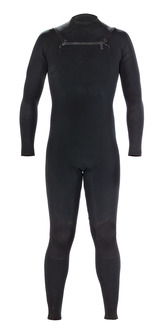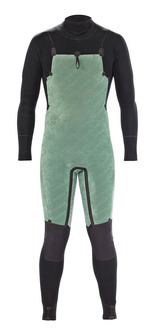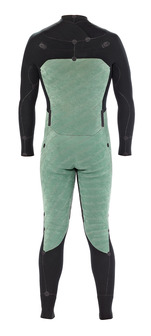Patagonia’s Plant-Based Wetsuit
The technology behind the eco-pioneering company’s prolific green innovation





With a committed mission to reducing their environmental impact, Patagonia has partnered with eco-friendly biomaterial firm Yulex to create the first plant-based wetsuit material. “Performance, natural rubber has not been used in wetsuits, ever,” says Patagonia’s director of surf projects Jason McCaffrey, adding, “the manufacturing process is almost entirely green.” The natural rubber is made from organic matter derived from the little-known Guayule plant, which grows in dry, arid environments and produces terpene resins that act as a natural pesticide. Requiring few resources and rendered inedible, a rise in the plant’s demand will not adversely impact food equity, as can be the case with some biofuels.

Once the Guayule plant has been harvested, it is mixed with water as a solvent for extracting rubber. “Traditional rubber plants and synthetic rubber production both use environmentally harmful solvents and create a vast amount of non-biodegradable byproducts,” McCaffrey says. Yulex’s Guayule-based rubber production creates only organic byproducts and uses only water solvents. As the plant pulp is mixed with water, the sap rises which becomes the rubber and, eventually, your new wetsuit. “The suits themselves are also biodegradable,” McCaffrey says.
Patagonia has spent several years developing the technology, but they don’t plan on keeping it to themselves for long. “There’s no point—from an ecological perspective—to develop this technology and be the only ones in the industry using it,” McCaffrey explains. Patagonia will share the Yulex wetsuit technology with all of the major wetsuit manufacturers in hopes of having the greatest environmental impact. “Eventually we want every suit from every company to be Yulex, but that’s a ways off,” says McCaffrey. Educating producers and customers about the traditional wetsuit production process is the first step in changing people’s minds, McCaffrey says. For Yulex, their collaboration with Patagonia is just the beginning. “Yulex’s Guayule-based biomaterials can replace petroleum-based synthetic materials,” says Yulex CEO Jeff Martin of his company’s plan to expand into various consumer and industrial products—further illustrating the far-reaching possibilities for the new technology.

In addition to being far more sustainable than traditional wetsuits, the plant-based suits perform the same in terms of warmth, flexibility and durability as their petroleum and limestone-based counterparts. “We’ve given wetsuits to a few friends to test without telling them it’s made from plants,” McCaffrey says, “the only difference they notice is the smell.” The Guayule-based suits naturally have a eucalyptus-like scent, a welcome change from traditional neoprene’s peculiar chemical smell.
Keep an eye on Patagonia’s wetsuit line as they integrate a Yulex blend into select suits this fall. Custom-made full-blend Yulex suits will be available from select flagship Patagonia surf stores in the coming months. In the meantime, enjoy today’s holiday as International Surfing Day.
Images courtesy of Patagonia and Yulex











